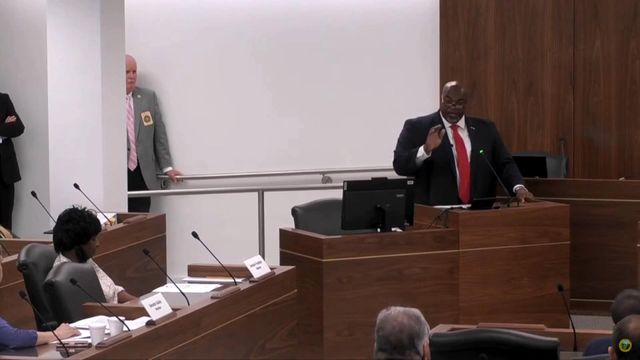NC could limit affirmative action as GOP lawmakers push back against critical race theory
A new bill rolled out Wednesday by the leader of the state Senate would prohibit North Carolina public schools from promoting the idea that one race or gender is inherently superior to another and that someone is inherently racist or sexist because of their race or gender.
Although it's not taught in K-12 schools, Senate President Pro Tem Phil Berger said he believes students are being indoctrinated with the basic ideology of critical race theory, an academic concept that looks at inequities in current American culture through the lens of the nation’s history of racism, including slavery and Jim Crow.
Berger, R-Rockingham, said he’s not trying to outlaw the teaching of American history, including the chapters that deal with racism. Instead, he said, he's trying to protect the ideals of classical liberalism from an ideology that seeks to overturn them.
"It teaches children to view the world and everyone in it always through the lens of race – that race and power define everything," he said. "It’s an either-or proposition: You either agree with them, or you’re racist."
Republican Lt. Gov. Mark Robinson, who has formed a state task force to address indoctrination in schools, spoke in support of the bill during a Senate Education committee meeting Tuesday afternoon.
"We're talking about students that are being compelled to go along with things that they blatantly do not agree with or being compelled to disavow what they believe in," Robinson said.
The bill also would require schools to put all teaching and training materials online for parents to review.
Sen. Jay Chaudhuri, D-Wake, said the First Amendment and case law already protect students from being indoctrinated in schools, and he asked for examples of the problem.
"I have not heard any concrete evidence of where students have been indoctrinated by their teachers that would reflect this to be a pervasive issue in our state," Chaudhuri said.
Robinson couldn't come up with an example of something the bill would address but said he would release a report next week.
"I want to make one thing clear. The issue of indoctrination of our children in our classrooms is real, folks," he said. "It's not some figment of somebody's imagination. It's happening all across the state, unfortunately."
Tamika Walker Kelly, president of the North Carolina Association of Educators, said Senate Republicans are trying to discredit teachers with the bill.
"Manufactured outrage over a political problem that does not exist is a shameless attempt to score political points," Kelly said.
Kristie Puckett-Williams, with the state chapter of the American Civil Liberties Union, agreed the bill will have a chilling effect on educators and said the discomfort lawmakers are concerned about is their own, not students'.
"This bill makes clear what marginalized communities have known for a while: This country does not want to reckon with racism and other aspects of its past and present," Puckett-Williams said.
The House already passed a bill restricting critical race theory in schools. No vote on the Senate version of the measure has been taken, and Berger didn't say when it would come up for a vote.
Berger also unveiled a proposed constitutional amendment that would ban both discrimination or preferential treatment "on the basis of race, sex, color, ethnicity, or national origin in the operation of public employment, public education, or public contracting."
When asked if such an amendment, which could be on the ballot next year, would prevent affirmative action efforts in hiring and government contracts, Berger said he didn't know.










